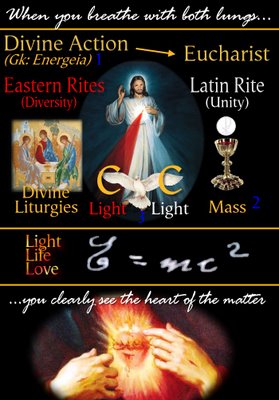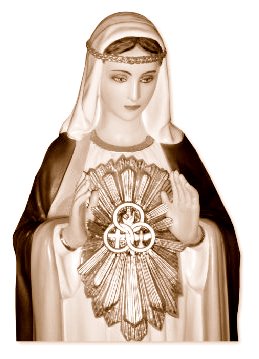"The Church fulfills its mission completely only when it reflects in itself the light of Christ the Lord"
Thus that light, as modest as its appearance upon the earth was, blazed forth powerfully in the heavens: the birth of the King of the Jews had been announced by the appearance of a star that was visible from very far away. This was the testimony of "some Magi" who had come from the East to Jerusalem shortly after the birth of Jesus, at the time of King Herod (cf. Matthew 2:1-2).
Once again there is a call and response between heaven and earth, between the cosmos and history. The ancient prophecies find confirmation in the language of the stars. "A star shall advance from Jacob, and a staff shall rise from Israel" (Numbers 24:17), the pagan seer Balaam had announced, who had been called upon to curse the people of Israel, but instead blessed them, because – as God revealed to him – " they are blessed" (Numbers 22:12).
Relating Balaam to the Magi, in his commentary on the Gospel of Matthew Chromatius of Aquileia writes: "He prophesied that Christ would come; they glimpsed him with the eyes of faith." And he adds an important observation: "The star was seen by all, but all did not understand its meaning. In the same way, our Lord and Savior was born for all, but all did not welcome him" (ibid, 4:1-2). This shows the meaning, in the historical perspective, of the light that appeared at the birth of Christ: it expresses the special blessing of God upon the descendants of Abraham, destined to be extended to all the peoples of the earth. The Gospel event that we recall at Epiphany – the visit of the Magi to the Child Jesus in Bethlehem – thus draws us back to the origins of the history of the people of God, to the calling of Abraham. We are in chapter 12 of the book of Genesis. The first 11 chapters are like grand frescoes that respond to some of humanity's fundamental questions: what is the origin of the universe and of the human race? Where does evil come from? Why are there different languages and civilizations?
Among the initial accounts of the Bible, there appears a first "covenant," which God established with Noah after the flood. This is a universal covenant, (((RAINBOW of LIGHT))) which concerns all of humanity: the new pact with the family of Noah is, at the same time, a pact with "all flesh."
Then, before the calling of Abraham, there is another grand fresco that is very important for understanding the meaning of the Epiphany: the account of the tower of Babel. The sacred text affirms that in the beginning, "The whole world spoke the same language, using the same words" (Genesis 11:1). Then men said, "Come, let us build ourselves a city and a tower with its top in the sky, and so make a name for ourselves; otherwise we shall be scattered all over the earth" (Genesis 11:4). The consequence of this sin of pride, analogous to that of Adam and Eve, was the confusion of languages and the dispersal of humanity all over the earth (cf. Genesis 11:7-8). This is what "Babel" means, and it was a sort of curse, similar to the expulsion from the earthly paradise.
It is at this point that the history of the blessing begins, with the calling of Abraham: there begins the great plan of God to make humanity into a family, through the covenant with a new people, chosen by Him that they might be a blessing among all the nations (cf. Genesis 12:1-3).
This divine plan is still unfolding, and had its culminating moment in the mystery of Christ.
It was then that the "last times" began, in the sense that the plan was fully revealed and realized in Christ, but it needs to be incorporated into human history, which remains always a story of faithfulness on God's part, and unfortunately of unfaithfulness on the part of us men. The Church itself, depository of the blessing, is holy and made up of sinners, and is marked by the tension between "already" and "not yet." In the fullness of time, Jesus Christ came to bring the covenant to fulfillment: He himself, true God and true man, is the Sacrament of God's faithfulness to his plan of salvation for all humanity, for all of us.
The arrival of the Magi from the East in Bethlehem, to adore the newborn Messiah, is the sign of the manifestation of the universal King to the people and to all men who seek the truth.
It is the beginning of a movement in the opposite direction of that of Babel: from confusion to understanding, from dispersion to reconciliation. We thus discover a link between Epiphany and Pentecost: if the Birth of Christ, who is the Head, is also the Birth of the Church, his body, we see in the Magi the peoples that are joined to the remnant of Israel, foreshadowing the great sign of the "polyglot Church," performed by the Holy Spirit fifty days after Easter. The faithful and steadfast love of God, who never falls short of his covenant from generation to generation, is the "mystery" of which Saint Paul speaks in his letters, including in the selection of the Letter to the Ephesians just proclaimed in the Mass. The Apostle affirms that this "mystery" "was made known to [him] by revelation" (Ephesians 3:2), and he was charged with making it known.
This "mystery" of God's faithfulness constitutes the hope of history. Of course, it is opposed by forces of division and oppression, which wound humanity through sin and conflicts of egoism. The Church is, in history, at the service of this "mystery" of blessing for all of humanity. In this mystery of the faithfulness of God, the Church fulfills its mission completely only when it reflects in itself the light of Christ the Lord, and so helps the peoples of the world along the way of peace and authentic progress.
In fact, the word of God revealed through the prophet Isaiah remains always valid: "Darkness covers the earth, and thick clouds cover the peoples, but upon you the Lord shines, and over you appears his glory" (Isaiah 60:2). What the prophet proclaims to Jerusalem is fulfilled in the Church of Christ: "Nations shall walk by your light, and kings by your shining radiance" (Isaiah 60:3).
With Jesus Christ, the blessing of Abraham has been extended to all peoples, to the universal Church as the new Israel that welcomes all of humanity into its bosom.
Today as well, nonetheless, what the prophet said remains true in many ways: "thick clouds cover the peoples" and our history. It cannot be said, in fact, that globalization is synonymous with world order; on the contrary. Conflicts for economic supremacy and the hoarding of energy, water, and basic material resources make difficult the work of those who, at every level, struggle to build a just and amicable world.
There is a need for a greater hope that makes it possible to prefer the common good of all to the wealth of few and the misery of many. "This great hope can only be God... Not any god, but the God who has a human face" (Spe Salvi," no. 31): the God who manifested himself in the Child of Bethlehem and in the Crucified and Risen One.
With great hope, one can persevere in sobriety. If true hope is lacking, one seeks happiness in intoxication, in the superfluous, in excess, and ruins oneself and the world. Moderation is not, then, only an ascetic rule, but also a way of salvation for humanity. It is now evident that only by adopting a sober lifestyle, accompanied by serious commitment to an equal distribution of wealth, that it will be possible to create a just and sustainable order of development.
For this reason, there is a need for men who can nourish great hope, and therefore possess much courage: the courage of the Magi, who undertook a long voyage following a star, and who knew to kneel down before a Child and offer him their precious gifts. We all need this courage, anchored by a solid hope. May Mary obtain this for us, accompanying us in our earthly pilgrimage with her maternal protection. Amen!
As for interreligious dialogue, the pope renewed his gratitude for the letter addressed to him last October by 138 Muslim personalities, and expressed his hope that there might emerge a "cooperation on matters of mutual interest, such as the dignity of the human person, the search for the common good, peace-building and development."
As for the essential rights of the person, Benedict XVI denounced the violations of religious freedom, the hidden threats "to the integrity of the family founded on the marriage of a man and a woman" and "the continual attacks perpetrated on every continent against human life." "
I would like to recall, together with many men and women dedicated to research and science, that the new frontiers reached in bioethics do not require us to choose between science and morality: rather, they oblige us to a moral use of science. On the other hand, recalling the appeal made by pope John Paul II on the occasion of the Jubilee Year 2000, I rejoice that on 18 December last the general assembly of the United Nations adopted a resolution calling upon states to institute a moratorium on the use of the death penalty, and I earnestly hope that this initiative will lead to public debate on the sacred character of human life." In these last words, it is easy to read a reference also to the "worldwide moratorium on abortion" invoked by a growing number of voices of different cultural and religious orientation.
Sincerely yours in Jesus and Mary,
Mike Rizzio, SOLT
Imitate Mary
Become like Jesus
Live for the Triune God
Seek the Light of Our Lord Jesus Christ
See you on the High Ground!
If you have a few minutes please go to the following sites
and see what I have been compelled to work on since 2004.
http://soltlaity.org/breadoflife.htm
http://soltlaity.org/slideshow.htm
I will attempt to answer any and all inquiries at jmjriz@aol.com.
+++
* - J.M.J. + O.B.T. + M.G.R. stands for: Jesus, Mary and Joseph;
O Beata Trinitas; St. Michael, St. Gabriel and St. Raphael































No comments:
Post a Comment